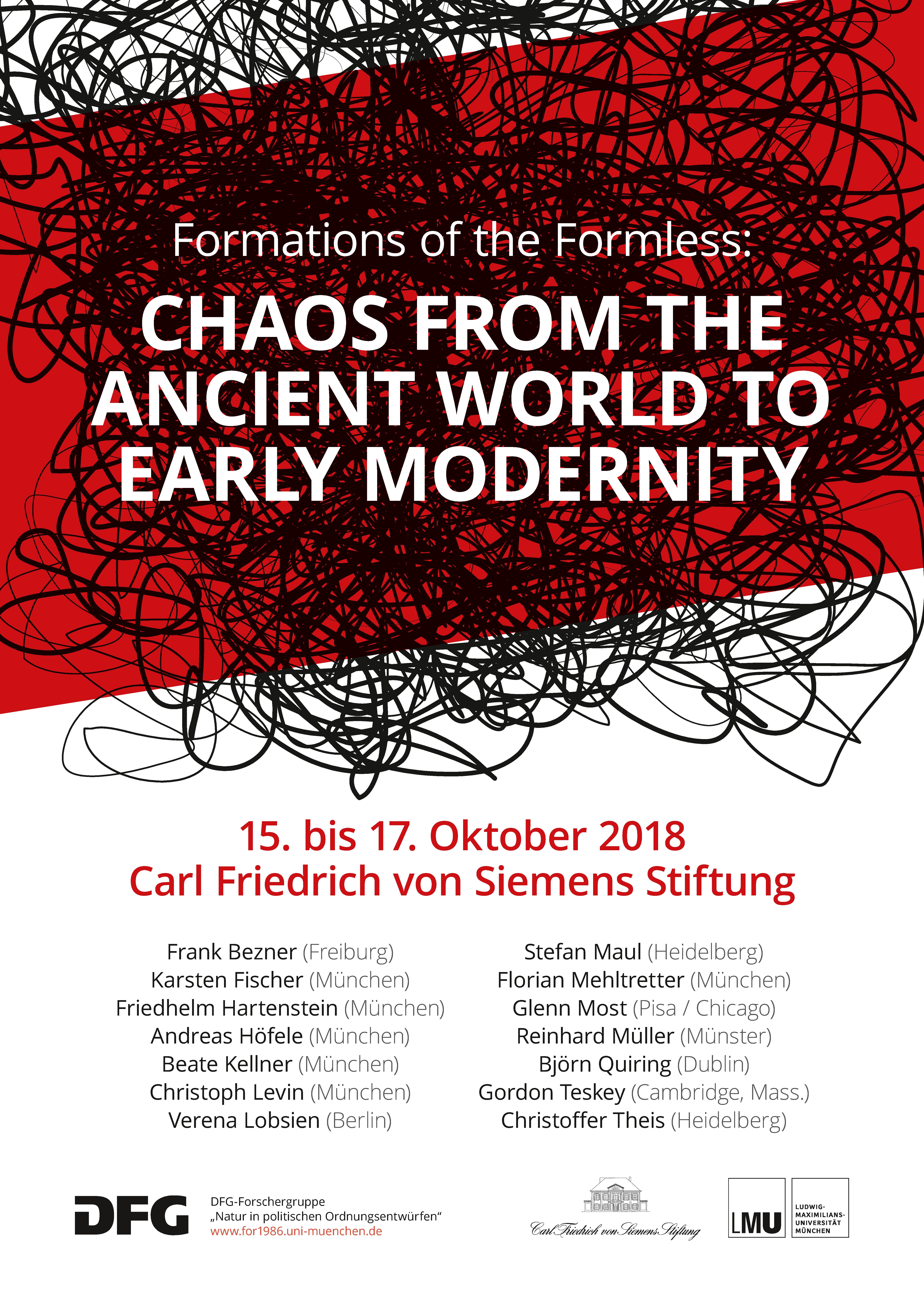Tagung: "Formations of the Formless: Chaos from the Ancient World to Early Modernity"
Veranstalter: Teilprojekt 1 (Levin/Müller) und Teilprojekt 9 (Höfele)
15.10.2018 – 17.10.2018
Ort: Carl Friedrich von Siemens Stiftung, Südliches Schlossrondell 23, 80638 München
Zeit: 15.10.-17.10.2018
Abstract:
Chaos is a perennial source of fear and fascination. As the original "formless void" (tohu-wa-bohu) mentioned in the book of Genesis, it precedes the created world: a state of anarchy before the establishment of cosmic order. But chaos has frequently also been conceived of as a force that persists in both the cosmos and society, threatening to undo them both. From the cultures of the ancient Near East and the Old Testament up to early modernity, notions of the divine have included the power to check and contain, but also to unleash chaos as a sanction against the violation of social and ethical norms. Yet chaos has also been construed as a necessary supplement to order, a region of pure potentiality that grounds reality and provides the raw material of creation, or even constitutes a kind of alternative order itself. As such, it assumes its own peculiar formations that sometimes mirror existing orders and sometimes point toward past or future ones.
The aim of the conference is to trace the genesis and development of the notion of chaos from the ancient Near East to early modern Europe across a variety of texts and discourses. It will address questions such as: How have the images and conceptualizations of absolute disorder been transformed over the centuries? How did prophets, poets and thinkers view the relationship between cosmic and political chaos? And how do pre-modern 'chaos theories' influence modernity?
Programm:
Monday 15 October
9.00 – 9.30 Introduction
9.30 – 10.30 Stefan Maul: Zwischen Chaos und Ordnung – Die babylonischen Lehren von der Dialektik des Werdens der Welt
10.30 – 11.30 Christoph Levin: Paradise Established: The Foundation of Kosmos versus Chaos according to Genesis 1–3
11.30 – 12.00 Coffee
12.00 – 13.00 Friedhelm Hartenstein: „[Wer] hat das Meer mit Türflügeln verschlossen?“ (Hiob 38,8): Zur uranfänglichen Kosmisierung des Chaos in den Gottesreden des Hiobbuchs und anderen weisheitlichen Schriften
13.00 – 14.15 Lunch
14.15 – 15.15 Christoffer Theis: More Heads – More Chaos? Entities with multiple heads in Egypt in comparison to Ancient Near Eastern motifs
15.15 – 15.45 Coffee
15.45 – 16.45 Florian Mehltretter: "Mixed abysses." Chaos and heterodoxy in late renaissance philosophical poetry
16.45 – 17.45 Karsten Fischer: Die Naturalisierung von Chaos und Ordnung: Thomas Hobbes und die Spielarten des Autoritarismus
Tuesday 16 October
9.00 – 10.00 Glenn Most: Chaos: From Hesiod to Derrida and Back
10.00 – 11.00 Frank Bezner: A Poetics of (Dis-)Order. Negotiating Chaos in Twelfth- Century Thought and Literature
11.00 – 11.30 Coffee
11.30 – 12.30 Verena Lobsien: Sympathy Lost. Pastoral Responses to Chaos (Sidney, Spenser and others)
12.30 – 14.00 Lunch
14.00 – 15.00 Gordon Teskey: Agon in Chaos: The Struggle with Thinking and with Matter in Spenser and Milton
15.00 – 15.30 Coffee
15.30 – 16.30 Björn Quiring: The Tartarean Jurisdiction of Chaos in Milton’s Paradise Lost
16.30 – 17.30 Beate Kellner: Chaos in komischer Literatur des späten Mittelalters und der frühen Neuzeit
Wednesday 17 October
9.00 – 10.00 Reinhard Müller: Die Verwandlung von Recht zu Wermut (Amos 5,7). Ein frühes Zeugnis alttestamentlicher Unheilsprophetie und seine kosmologischen Hintergründe
10.00 – 10.30 Coffee
10.30 – 11.30 Andreas Höfele: 'Come to great confusion': Chaos in King Lear
11.30 – 12.30 Concluding Discussion
Downloads
- Poster: Formations of the Formless (4 MByte)
- Flyer: Formations of the Formless (917 KByte)


